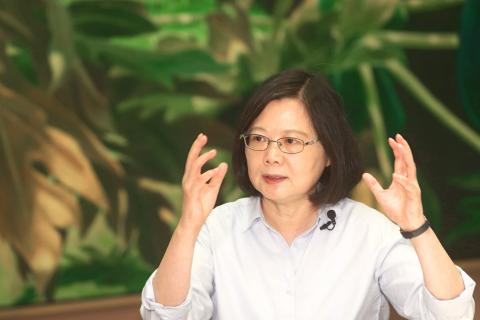President Tsai Ing-wen (蔡英文) on Sunday said that constitutional reform is a bottom-up undertaking that should not be initiated by the Democratic Progressive Party (DPP) without majority public participation.
“One political party by itself is not capable of carrying out such a huge task and we will explore the chances of holding dialogue with other political parties in the next phase,” Tsai said in an interview with the Central News Agency.
Tsai, who is also DPP chairperson, said at the party’s 17th national congress on Sept. 24 that the constitutional reform plan would include issues such as lowering the voting age to 18, codifying human rights and reforming the legislative election system to get rid of unequal vote values and inequitable representation.

Photo: CNA
Asked whether the reform should include a change to a Cabinet or fully presidential system of government, Tsai said she did not want to impose her personal views on the issue at this stage.
Constitutional reform is a task that should be tackled from the bottom to the top to allow participation by the majority of people, she said.
“Carrying out constitutional reform is like making a garment that must fit the person’s needs,” Tsai said. “It is important to have experienced people taking part in the discussions so that the reform will fit Taiwan’s current needs.”
Turning to the issue of the president giving a state of the nation address in the legislature, Tsai said she would not rule out becoming the first Taiwanese president to do so, if it was something the majority of people wanted.
The Additional Articles of the Constitution of the Republic of China states that the president can give a state of the nation address in the legislature.
Asked whether the timing of a constitutional reform referendum would be tied to the election cycle, Tsai said she was not thinking along those lines and that it would all depend on how the issue evolved.
Local government elections are to be held next year, while the presidential and legislative elections are due in 2020.
Addressing a controversy over recent comments by newly appointed Premier William Lai (賴清德), Tsai said Lai is fully aware of the government’s overall policy goals and understands very well “what the limits are.”
On Sept. 26, Lai said in his first report to the legislature that he was “a pragmatic supporter of Taiwanese independence.”
“The two sides of the Taiwan Strait are independent of each other, with Taiwan being an independent sovereign state whose official title is the Republic of China,” Lai said in response to lawmakers’ questions about his views on cross-strait issues.
His comments sparked a firestorm at home and drew attention in the international community, including in China and the US, prompting the Presidential Office to issue a statement that the government had not changed its cross-strait policy.
In a follow-up statement on Friday, Lai said that the president was responsible for cross-strait policy and that in his role as premier, he would adhere to Tsai’s policy of maintaining the “status quo” across the Taiwan Strait.

A magnitude 7.0 earthquake struck off Yilan at 11:05pm yesterday, the Central Weather Administration (CWA) said. The epicenter was located at sea, about 32.3km east of Yilan County Hall, at a depth of 72.8km, CWA data showed There were no immediate reports of damage. The intensity of the quake, which gauges the actual effect of a seismic event, measured 4 in Yilan County area on Taiwan’s seven-tier intensity scale, the data showed. It measured 4 in other parts of eastern, northern and central Taiwan as well as Tainan, and 3 in Kaohsiung and Pingtung County, and 2 in Lienchiang and Penghu counties and 1

FOREIGN INTERFERENCE: Beijing would likely intensify public opinion warfare in next year’s local elections to prevent Lai from getting re-elected, the ‘Yomiuri Shimbun’ said Internal documents from a Chinese artificial intelligence (AI) company indicated that China has been using the technology to intervene in foreign elections, including propaganda targeting Taiwan’s local elections next year and presidential elections in 2028, a Japanese newspaper reported yesterday. The Institute of National Security of Vanderbilt University obtained nearly 400 pages of documents from GoLaxy, a company with ties to the Chinese government, and found evidence that it had apparently deployed sophisticated, AI-driven propaganda campaigns in Hong Kong and Taiwan to shape public opinion, the Yomiuri Shimbun reported. GoLaxy provides insights, situation analysis and public opinion-shaping technology by conducting network surveillance

‘POLITICAL GAME’: DPP lawmakers said the motion would not meet the legislative threshold needed, and accused the KMT and the TPP of trivializing the Constitution The Legislative Yuan yesterday approved a motion to initiate impeachment proceedings against President William Lai (賴清德), saying he had undermined Taiwan’s constitutional order and democracy. The motion was approved 61-50 by lawmakers from the main opposition Chinese Nationalist Party (KMT) and the smaller Taiwan People’s Party (TPP), who together hold a legislative majority. Under the motion, a roll call vote for impeachment would be held on May 19 next year, after various hearings are held and Lai is given the chance to defend himself. The move came after Lai on Monday last week did not promulgate an amendment passed by the legislature that

AFTERMATH: The Taipei City Government said it received 39 minor incident reports including gas leaks, water leaks and outages, and a damaged traffic signal A magnitude 7.0 earthquake struck off Taiwan’s northeastern coast late on Saturday, producing only two major aftershocks as of yesterday noon, the Central Weather Administration (CWA) said. The limited aftershocks contrast with last year’s major earthquake in Hualien County, as Saturday’s earthquake occurred at a greater depth in a subduction zone. Saturday’s earthquake struck at 11:05pm, with its hypocenter about 32.3km east of Yilan County Hall, at a depth of 72.8km. Shaking was felt in 17 administrative regions north of Tainan and in eastern Taiwan, reaching intensity level 4 on Taiwan’s seven-tier seismic scale, the CWA said. In Hualien, the